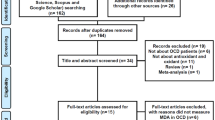Abstract
Oxidative stress has been found to play important role in several neuropsychiatric diseases including Obsessive Compulsive Disorder. A longitudinal case control study was conducted to evaluate the oxidative stress in 30 newly diagnosed obsessive compulsive disorder patients and same number of control patients. Serum thiobarbituric acid reacting substances, plasma ascorbate were assessed to evaluate oxidative stress and Yale Brown obsessive compulsive scale for disease severity before and after treatment with Fluoxetine at the average dosage of 40 mg/day. Improvement in Yale Brown obsessive compulsive scale score by about 43% after 12 weeks treatment was associated with significantly decreased thiobarbituric acid reacting substances and increased plasma ascorbate values (p < 0.05). The newly diagnosed obsessive compulsive disorder patients had higher serum thiobarbituric acid reacting substances as well as a lower plasma ascorbate levels than the control population. Thus, the present study suggested a significant role of oxidative stress in obsessive compulsive disorder and showed that a successful treatment with Fluoxetine not only improves the clinical scenario but also reduces the oxidative stress that may further improve the prognosis of the disease.
Similar content being viewed by others
References
Lancu L, Dannon PN, Zohar J. Obsessive-compulsive disorder. In: Gelder MG, Lopez Ibor JJ, Andreasen. (Eds.), New Oxford Textbook of Psychiatry, Vol-1. Oxford University Press Inc, New York, US 2005: pp. 823.
Robins LN, Helzer JE, Weissman MM, Orvaschel H, Gruenberg E, Burke JD Jr, Regier DA. Lifetime prevalence of specific psychiatric disorders in three sites. Arch Gen Psych 1984; 41: 949–958.
Karno M, Golding JM, Sorenson SB, Burnam MA. The epidemiology of obsessive compulsive disorder in five US communities. Arch Gen Psych 1988; 45: 1094–1099.
Bilici M, Efe H, Koroglu MA, Uydu HA, Bekaroglu M, Deger O. Antioxidative enzyme activities and lipid peroxidation in major depression: Alteration by antidepressant treatment. J Affect Disord 2001; 64: 43–51.
Dadheech G, Mishra S, Gautam S, Sharma P. Evaluation of antioxidant deficit in schizophrenia. Ind J Psych 2008; 50: 16–20.
Mahadik SP, Evans DR. Is Schizophrenia a metabolic brain disorder? Membrane phospholipid dysregulation and its therapeutic implication. Psychiatric Clinics of North America 2003; 26: 93.
Jesberger JA. Oxygen free radical and brain function. Int J Neurosci 1991; 57: 1–17.
Weber GF. The pathophysiology of reactive oxygen intermediates in the central nervous system. Med Hypothesis 1994; 43: 223–230.
Ersan, S, Bakir, E, Ersan EE, Dogan O. Examination of free radical metabolism and antioxidant defence system elements in patients with obsessive compulsive disorder. Progress in Neuro-Psychopharmacol Biol Psychiatry 2006; 30: 1039–1042.
Lohr JB. Oxygen radicals and neuropsychiatric illness. Some speculations. Arch Gen Psych 1991; 48: 1097–1106.
Pigott TA, Seay SM. A review of the efficacy of selective serotonin reuptake inhibitors in obsessive compulsive disorder. J Clin Psych 1999; 60: 101–106.
Goodman WK, Price LH, Rasmussen SA. et al. The Yale-Brown Obsessive Compulsive Scale. Arch Gen Psych 1989; 46: 1006–1016.
Dakhale GN, Khanzode SD, Khanzode SS, Saoji A. Supplementation of vitamin C with atypical antipsychotics reduces oxidative stress and improves the outcome of schizophrenia. Psychopharmacol (Berl) 2005; 182(4): Epub Oct 19.
Dahle LK, Hill EG, Holman RT. The thiobarbituric acid reaction and the auto oxidation of polyunsaturated fatty acid methyl esters. Arch Biochem Biophys 1962; 98: 253–261.
McCormick DB, Greene HL. Vitamins. In: Burtis CA, Ashwood ER, editors. Tietz Textbook of Clinical Chemistry. 3rd edition, W.B. Saunders Company Philadelphia 1999: pp 1025.
Koran LM. Obsessive-Compulsive and related disorders in adults-A comprehensive clinical guide. Cambridge University Press, First South Asian edition, Replica press Pvt Ltd, Delhi 2000, pp 48–49.
Koluglu M, Atmaca M, Tezcan E, Gecici O, Tunckol H, Ustundag B. Antioxidant Enzyme Activities and Malondialdehyde Levels in Patients with Obsessive-Compulsive Disorder. Neuropsychobiol 2002; 46: 27–32.
Dadheech G, Mishra S, Gautam S, Sharma P. Oxidative stress and ascorbic acid status in schizophrenics. SFRR-Indian Bull 2005; 4: 23–25.
Dadheech G, Mishra S, Gautam S, Sharma P. Oxidative stress, α-tocopherol, ascorbic acid and reduced glutathione status in schizophrenics. Ind J Clin Biochem 2006;21:34–38.
Author information
Authors and Affiliations
Corresponding author
Rights and permissions
About this article
Cite this article
Chakraborty, S., Dasgupta, A., Das, H.N. et al. Study of oxidative stress in obsessive compulsive disorder in response to treatment with Fluoxetine. Indian J Clin Biochem 24, 194–197 (2009). https://doi.org/10.1007/s12291-009-0035-9
Published:
Issue Date:
DOI: https://doi.org/10.1007/s12291-009-0035-9




